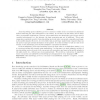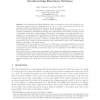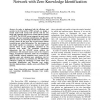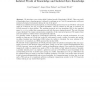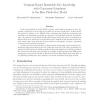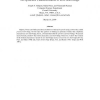160
click to vote
TCC
2012
Springer
13 years 9 months ago
2012
Springer
We propose a 2-party UC-secure protocol that can compute any function securely. The protocol requires only two messages, communication that is poly-logarithmic in the size of the ...
145
click to vote
IACR
2011
14 years 1 months ago
2011
A zero-knowledge protocol allows a prover to convince a verifier of the correctness of a statement without disclosing any other information to the verifier. It is a basic tool a...
111
click to vote
IACR
2011
14 years 1 months ago
2011
Zero knowledge sets (ZKS) [18] allow a party to commit to a secret set S and then to, non interactively, produce proofs for statements such as x ∈ S or x /∈ S. As recognized in...
143
click to vote
ASIACRYPT
2011
Springer
14 years 2 months ago
2011
Springer
A fundamental question in cryptography deals with understanding the role that randomness plays in cryptographic protocols and to what extent it is necessary. One particular line o...
133
click to vote
JCP
2008
15 years 2 months ago
2008
In order to implement both the efficiency and security in the Peer-to-Peer (P2P) network, we design a trusted small world overlay P2P network with the role based and reputation bas...
137
click to vote
EUROCRYPT
2008
Springer
15 years 3 months ago
2008
Springer
We introduce a new notion called -isolated proofs of knowledge ( -IPoK). These are proofs of knowledge where a cheating prover is allowed to exchange up to bits of communication wi...
126
click to vote
EUROCRYPT
2007
Springer
15 years 6 months ago
2007
Springer
Abstract. We introduce a notion of instance-dependent verifiable random functions (InstD-VRFs for short). Informally, an InstD-VRF is, in some sense, a verifiable random function [...
231
click to vote
CRYPTO
2004
Springer
15 years 7 months ago
2004
Springer
In the bare public-key model (BPK in short), each verifier is assumed to have deposited a public key in a file that is accessible by all users at all times. In this model, intro...
110
click to vote
TCC
2007
Springer
15 years 8 months ago
2007
Springer
Abstract. Algorithmic progress and future technology threaten today’s cryptographic protocols. Long-term secure protocols should not even in future reveal more information to a�...
126
click to vote
TARK
2009
Springer
15 years 8 months ago
2009
Springer
Halpern, Moses and Tuttle presented a definition of interactive proofs using a notion they called practical knowledge, but left open the question of finding an epistemic formula...

